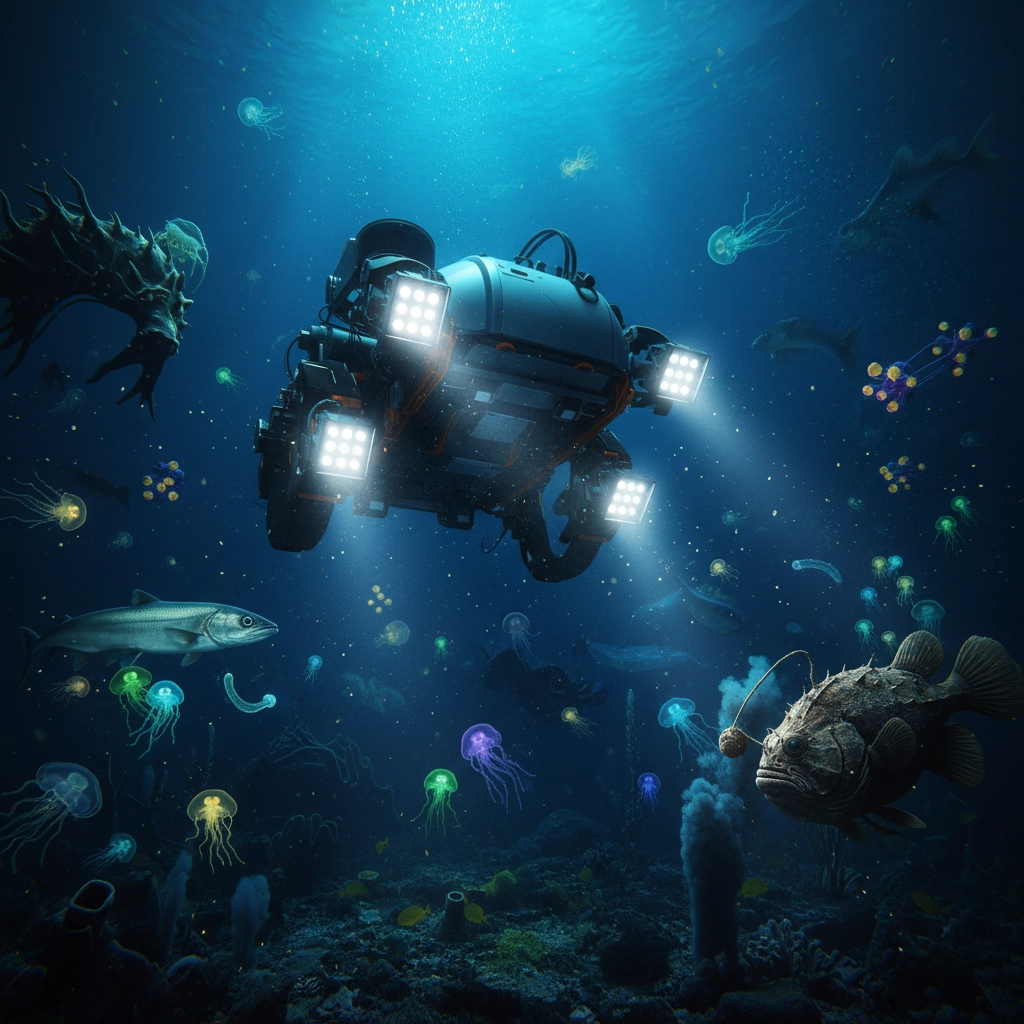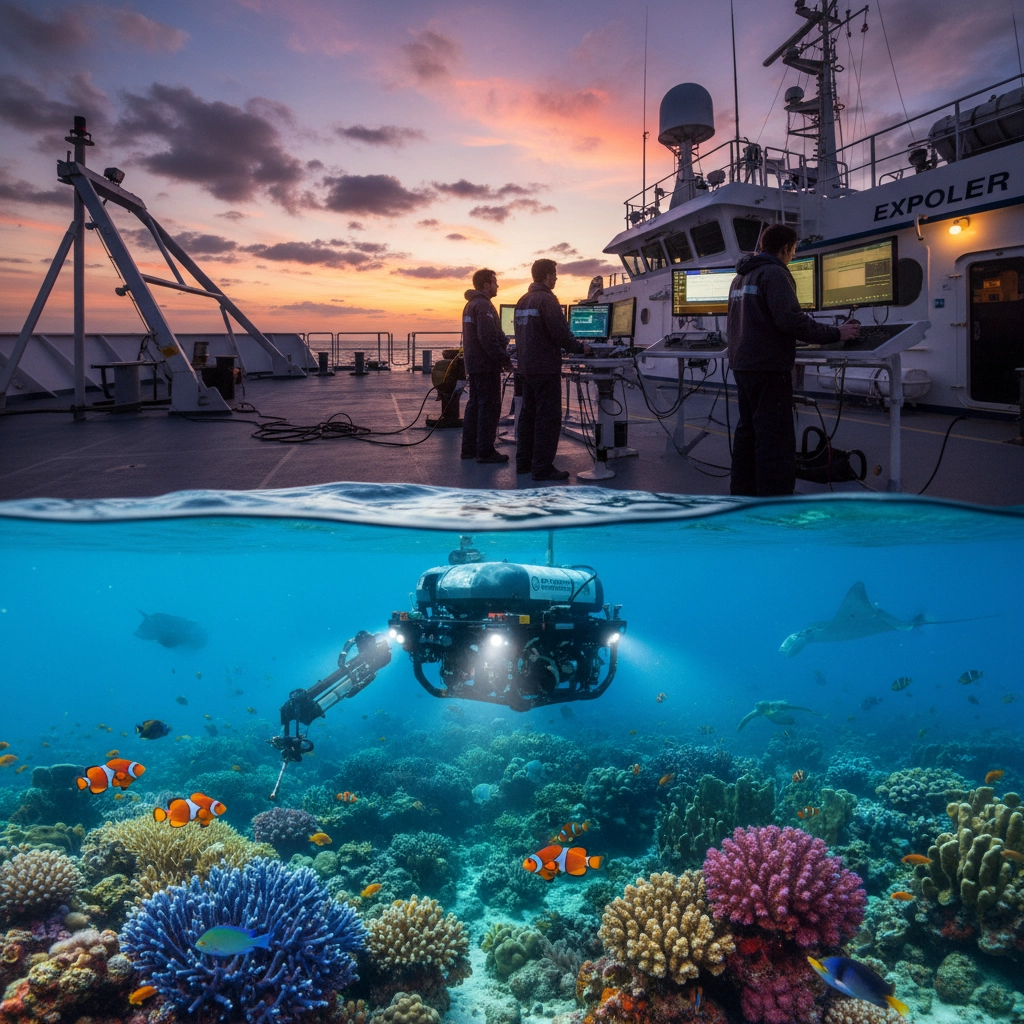marine science expeditions
- Caleb Mullenix
- Oct 30, 2025
- 5 min read
Understanding marine science expeditions is essential for educators seeking to inspire the next generation of ocean scientists and conservationists. These large-scale research missions represent the cutting edge of ocean exploration, combining advanced technology with collaborative scientific inquiry to unlock the mysteries of our planet's most unexplored frontier.
The Foundation of Modern Ocean Exploration
Marine science expeditions in 2025 have demonstrated unprecedented coordination among research institutions, government agencies, and international partners. These missions extend far beyond simple data collection: they represent comprehensive efforts to characterize previously unstudied ocean regions while engaging students, educators, and communities in real-time discovery.
The scope of these expeditions is remarkable. Research vessels equipped with remotely operated vehicles (ROVs), autonomous underwater vehicles, and advanced mapping systems now explore depths previously inaccessible to human investigation. This technology enables scientists to conduct live video streaming of deep-sea discoveries, transforming ocean exploration into an educational experience that students worldwide can witness as it unfolds.

NOAA Ocean Exploration: Leading Deep-Sea Discovery
The National Oceanic and Atmospheric Administration has established itself as a leader in systematic ocean exploration through coordinated expedition campaigns. Their 2025 field season exemplified the meticulous planning and execution required for successful marine science expeditions.
Beginning with a comprehensive shakedown expedition off Hawai'i in March 2025, NOAA's approach demonstrates the importance of thorough preparation. The NOAA Ship Okeanos Explorer underwent extensive testing of ROVs Deep Discoverer and Seirios, along with mapping and telepresence systems, ensuring all equipment functioned properly before commencing primary research operations.
The centerpiece of NOAA's 2025 efforts, the "Beyond the Blue: Illuminating the Pacific" campaign, showcased how modern expeditions integrate multiple research objectives. From April through May 2025, researchers explored deep waters in and around Papahānaumokuākea Marine National Monument, conducting daytime ROV dives while simultaneously performing overnight mapping operations. This dual approach maximizes research efficiency while maintaining continuous data collection.
Technology Integration in Marine Expeditions
Modern marine science expeditions rely heavily on sophisticated technology integration to achieve research objectives. The coordination between surface vessels, underwater vehicles, and shore-based support teams requires precise planning and communication protocols.
Telepresence technology has revolutionized how expeditions engage educational communities. Students and educators can now participate virtually in deep-sea exploration, observing live video feeds as scientists make discoveries thousands of meters below the ocean surface. This real-time engagement transforms abstract oceanographic concepts into tangible, exciting experiences that inspire future marine scientists.

The mapping technologies employed during these expeditions contribute directly to national and international ocean mapping initiatives. Each expedition adds crucial data to the U.S. National Strategy for Ocean Mapping, Exploration, and Characterization, ensuring that collected information supports both immediate research goals and long-term conservation planning.
The E/V Nautilus Model for Student Engagement
The Exploration Vessel Nautilus represents an exemplary model for combining rigorous scientific research with educational outreach. During their 2025 Western Pacific expeditions, this vessel demonstrated how marine science expeditions can serve multiple constituencies simultaneously.
From May through June 2025, E/V Nautilus explored the Mariana Islands region, one of Earth's most tectonically and volcanically dynamic locations. These waters contain unique habitats including the deepest ocean areas and the largest mud volcanoes on the planet. The expedition's approach to student engagement included live video streaming of ROV dives, making deep-sea exploration accessible to classrooms worldwide.
The vessel's commitment to engaging students, educators, and early career professionals both at sea and onshore demonstrates how expeditions can serve as powerful educational tools. By including participants from communities in the regions being explored, these expeditions build local capacity while advancing scientific understanding.
Professional Development Through Expedition Experience
Marine science expeditions increasingly serve as platforms for professional development and skill building. The Schmidt Ocean Institute's Deep-Sea Expedition Leadership Master Class exemplifies this approach, bringing together current and past program fellows to develop essential expedition coordination and management skills.
This intensive training program aboard the RV Falkor (too) provided participants with hands-on experience in developing competitive research proposals, designing functional cruise plans, managing expedition data, and improving science communication skills. Such programs demonstrate how expeditions can serve dual purposes: advancing scientific research while developing the next generation of expedition leaders.

For educators considering how to connect students with marine science opportunities, these professional development programs highlight the importance of practical experience in expedition planning and execution. Understanding the complexity of coordinating multi-week research missions helps students appreciate the dedication and expertise required for successful ocean exploration.
International Collaboration and Ocean Census Initiatives
The global nature of ocean research requires international collaboration to address the scale of marine biodiversity and ecosystem challenges. Ocean Census expeditions in 2025 demonstrated how international partnerships can accelerate scientific discovery while sharing costs and expertise.
Notable collaborations included the JAMSTEC Shinkai expedition, a 20-day research mission with the Japanese Agency of Marine-Earth Science and Technology, and the South Sandwich Islands Expedition, conducted in partnership with Schmidt Ocean Institute. These collaborations showcase how marine science expeditions can bridge national boundaries to address global ocean challenges.
The Ocean Census approach to expedition awards demonstrates how competitive funding can drive innovation in marine research. By supporting expeditions focused on unlocking marine biodiversity secrets, these programs ensure that research efforts address critical knowledge gaps while maintaining scientific rigor.
Research Objectives and Conservation Impact
Modern marine science expeditions consistently emphasize the connection between scientific discovery and conservation applications. The data collected during these missions directly supports conservation and resource management decisions, transforming abstract research into practical environmental stewardship.
Characterizing deep-sea habitats, mapping previously unexplored seafloor regions, and advancing understanding of ocean changes represent core objectives that extend beyond academic inquiry. These research goals align with national and international ocean management strategies, ensuring that expedition results contribute to evidence-based policy development.

The open sharing of collected data represents a crucial component of modern expedition philosophy. Rather than restricting access to research results, leading expedition programs ensure that collected information builds upon decades of scientific study while remaining accessible to researchers, educators, and students worldwide.
Connecting Students to Marine Science Opportunities
For educators seeking to connect students with marine science experiences, understanding the scope and objectives of major expeditions provides crucial context for developing engaging curriculum and potentially life-changing educational opportunities.
Programs like those offered by Appleseed Expeditions provide students with hands-on marine science experiences that mirror the methodologies and objectives of major research expeditions. These educational programs help students understand the connection between classroom learning and real-world scientific discovery.
Students who participate in marine science educational programs gain appreciation for the complexity and importance of ocean research while developing practical skills in data collection, observation, and scientific communication. These experiences often inspire students to pursue careers in marine science, oceanography, or related conservation fields.
Preparing Students for Future Ocean Exploration
Marine science expeditions represent the future of ocean research, combining advanced technology with collaborative scientific inquiry to address critical environmental challenges. For educators, understanding these expeditions provides valuable context for inspiring students while demonstrating the practical applications of marine science education.
Encouraging students to follow current expeditions through live streaming, data sharing platforms, and educational resources helps them understand how scientific discovery unfolds in real-time. This engagement transforms oceanography from an abstract subject into an active, exciting field where new discoveries occur regularly.
The integration of technology, international collaboration, and educational outreach in modern marine science expeditions demonstrates how scientific research can serve multiple purposes while maintaining rigorous standards. These expeditions represent not just scientific endeavors, but educational opportunities that inspire the next generation of ocean scientists and conservation advocates.



Comments